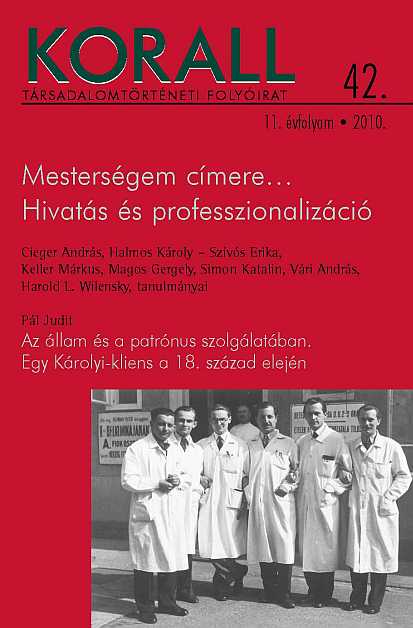Félprofik, parciális polgárok, egészen úriemberek? A professzionalizációs folyamat útjai és kutatási alternatívái a 19. századi Európában
Semi-Professionals, Partly Bourgeois – Fully Gentlemen?
Author(s): András VáriSubject(s): History
Published by: KORALL Társadalomtörténeti Egyesület
Summary/Abstract: The study addresses the problem of the historical development of social groups which embraced a strategy of professionalization in the course of the eighteenth and nineteenth centuries, but had less than full success with the project. This is the group of what might be called ‘semi-professionals’. The original sociological model of professionalization includes a number of clearly defined criteria. However, drawing a sharp dividing line between professionals and other vocational groups only reveals those groups aspiring to professional status, which have in fact remained on the less fortunate side of that dividing line. This study examines those groups which had partial success in professionalization. The largest ‘semi-professional’ groups in mid-nineteenth-century Europe were engineers, surveyors, and agricultural experts. By the late nineteenth century, these groups managed to establish specialized vocational training institutes. The diplomas conferred by these institutes served to define the group, but failed to establish a job monopoly. Regarding the kind of techniques that were employed in order to accelerate the ‘professional project’, it emerges that an aid to ‘professionalization’ might have been supplied by an ideological charge. An example for this is when an individual was considered to be a good (and vocal) engineer and an ardent (and vocal) patriot at the same time. In this case, either the first quality could latch onto the second, or the second one could carry the first. Out of the many possible variations, some examples of similar ideological charge are also described in the study. ‘Professionalizing’ groups with ideological sidelines were so common that one hesitates to use these supplementary factors as defining criteria. Instead of attempting to create a ‘typology’ of successful and semi-realized or partial professionalization projects, the study focuses on the contemporary social scenes, especially the exchange between professionalizing groups and others which these professionals associated themselves with. Two major comparative cases are discussed: the relationship of the notion of the gentleman and that of the professional in England, and the relationship of professionals to the process of embourgeoisement (Verbürgerlichung in German-speaking lands including Austrian territories). First, the results of research on the professionalization project in Britain are examined, engaged as it was in a long-term, nation-wide flow of public discourse. This discourse has linked the ‘service component’ to the ideal of the gentleman; and the cultivated, refined ‘gentleman component’ to the ideal of the professional — redefining and strengthening one another in the process. In the same way, the early nineteenth-century German university reform and its subsequent amendmends went a long way towards defining the part of the middle class called Bildungsbürger. The fight of ‘semi-professional’ engineers for the victory of their ‘professional pro
Journal: Korall - Társadalomtörténeti folyóirat
- Issue Year: 2010
- Issue No: 42
- Page Range: 151-178
- Page Count: 28
- Language: Hungarian

